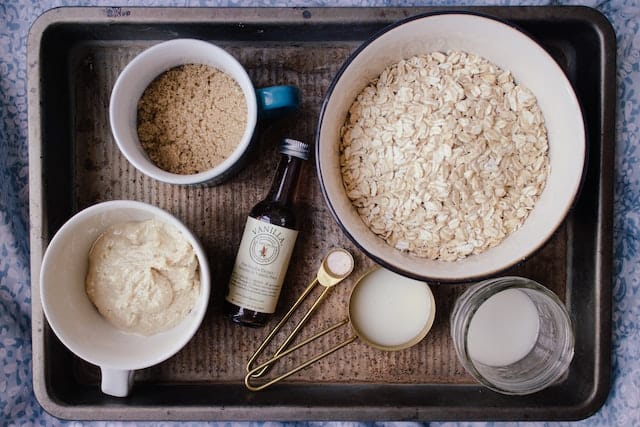Oat milk has become a popular alternative to dairy milk due to its nutritional benefits and environmental impact. But can oat milk also benefit breastfeeding mothers and their babies?
Breastfeeding is a crucial time for both mother and baby, and ensuring proper nutrition is essential. Oat milk is a great source of nutrients, including calcium, iron, and vitamin D, which are important for both the mother and baby’s health.
Additionally, oat milk is naturally lactose-free, making it a suitable option for those with lactose intolerance.
While oat milk can be a healthy addition to a breastfeeding mother’s diet, it is important to consult with a lactation consultant or healthcare provider before making any dietary changes. Understanding the nutritional profile of oat milk and its potential benefits can help mothers make informed decisions about incorporating it into their diet.
Key Takeaways
- Oat milk is a nutritious alternative to dairy milk that can benefit breastfeeding mothers and their babies.
- Oat milk is a good source of calcium, iron, and vitamin D, and is naturally lactose-free.
- Consultation with a lactation consultant or healthcare provider is recommended before making any dietary changes during breastfeeding.
Understanding Oat Milk

Oat milk is a plant-based, non-dairy milk alternative that has become increasingly popular in recent years. It is made by blending oats with water and then straining the mixture to remove any solids. The resulting liquid is creamy and has a slightly sweet taste, making it a great addition to coffee, smoothies, and other recipes.
One of the benefits of oat milk is that it is naturally free from lactose, making it a great option for those who are lactose intolerant or have a dairy allergy. It is also low in fat and calories, making it a healthier alternative to traditional dairy milk.
Oat milk is also easy to make at home, which is a great option for those who want to avoid the added sugars and preservatives found in store-bought brands. To make homemade oat milk, simply blend oats with water and strain the mixture through a cheesecloth or nut milk bag.
When it comes to brands, there are many options available on the market. Some popular brands include Oatly, Pacific Foods, and Califia Farms. It is important to read the labels carefully to ensure that the oat milk is free from any added sugars or preservatives.
Overall, oat milk is a great option for those looking for a non-dairy milk alternative. It is easy to make at home, low in fat and calories, and has a slightly sweet taste that makes it a great addition to many recipes.
Nutritional Profile of Oat Milk
Oat milk is a plant-based milk alternative that is becoming increasingly popular among breastfeeding mothers due to its nutritional benefits. It is a nutritious and delicious option for those who are looking for a dairy-free and vegan-friendly milk alternative.
Oat milk is rich in essential nutrients, including iron, fiber, calcium, protein, and vitamins. It also contains beta-glucan, a type of soluble fiber that has been shown to lower cholesterol levels and improve heart health.
One cup of oat milk contains approximately 130 calories and 16 grams of carbohydrates. It is a good source of minerals such as magnesium, phosphorus, and potassium. Oat milk is also fortified with vitamin D and B vitamins, making it a nutritious choice for breastfeeding mothers.
Compared to other plant-based milk alternatives, oat milk is higher in calories and carbohydrates. However, it is also more nutritious and contains more protein and fiber than other milk alternatives.
Overall, oat milk is a nutritious and delicious option for breastfeeding mothers who are looking for a dairy-free and vegan-friendly milk alternative. Its rich nutritional profile makes it an excellent source of essential nutrients that are important for both mother and baby.
Oat Milk and Breastfeeding

Oat milk is a popular alternative to cow’s milk, and it is becoming increasingly popular among breastfeeding mothers. While there is no scientific evidence to support the claim that oat milk can increase breast milk supply, it is a nutritious and healthy addition to a lactating mother’s diet.
Breastfeeding mothers need to consume a healthy and balanced diet to ensure that their body can produce enough milk for their baby. Oat milk is a good source of vitamins and minerals, including calcium, vitamin D, and iron, which are essential for a lactating mother’s health.
Oats contain beta-glucans, a type of soluble fiber that has been shown to have a positive effect on cholesterol levels and heart health. It is also believed that beta-glucans can stimulate the production of prolactin, a hormone that is essential for milk production.
It is important to note that while oat milk is a healthy addition to a lactating mother’s diet, it should not be used as a replacement for breast milk or formula. Breast milk is the best source of nutrition for a baby, and it provides essential nutrients and antibodies that cannot be found in any other food.
In summary, oat milk is a nutritious and healthy addition to a breastfeeding mother’s diet. While it is not a magical solution for increasing milk supply, it is a good source of essential vitamins and minerals that can support lactation.
Health Benefits of Oat Milk for Mothers
Oat milk is a popular alternative to cow’s milk, and it has become increasingly popular among breastfeeding mothers. Oat milk is a plant-based milk that is made by blending oats with water and then straining the mixture to remove any solids.
It is a great alternative for those who are lactose intolerant, vegan, or simply looking for a healthier option.
Here are some of the health benefits of oat milk for mothers:
1. High in Nutrients
Oat milk is a good source of nutrients such as fiber, protein, vitamin B12, and vitamin D. It also contains minerals such as calcium, iron, and magnesium.
These nutrients are essential for maintaining good health, especially for breastfeeding mothers.
2. Good for Heart Health
Oat milk is low in fat and cholesterol, which makes it a heart-healthy option. It contains beta-glucans, which are a type of soluble fiber that can help reduce cholesterol levels in the body.
This, in turn, can help reduce the risk of heart disease.
3. Boosts Immune System
Oat milk contains beta-glucans, which have been shown to boost the immune system. Beta-glucans stimulate the activity of white blood cells, which are responsible for fighting off infections and diseases.
4. Helps with Digestion
Oat milk is a good source of fiber, which can help improve digestion. Fiber helps to keep the digestive system healthy by promoting regular bowel movements and preventing constipation.
5. Improves Mood
Oat milk contains tryptophan, an amino acid that is essential for the production of serotonin. Serotonin is a neurotransmitter that helps regulate mood, sleep, and appetite.
Consuming foods that are high in tryptophan, such as oat milk, can help improve mood and reduce symptoms of depression.
In conclusion, oat milk is a nutritious and healthy alternative to cow’s milk. It is a great option for breastfeeding mothers who are looking for a plant-based milk that is high in nutrients, good for heart health, boosts the immune system, helps with digestion, and improves mood.
Oat Milk in Mother’s Diet

Oat milk is a popular non-dairy milk alternative that is made from oats and water. It is an excellent source of nutrients and is suitable for breastfeeding mothers who are looking for alternatives to dairy milk. Oat milk is a good source of fiber, protein, vitamins, and minerals that are essential for the mother and baby’s health.
Oats are known to improve lactation in breastfeeding mothers. Oatmeal is a great breakfast option for lactating mothers as it is a rich source of iron, fiber, and protein. It is also a good source of carbohydrates that provide energy to the mother.
Adding oat milk to coffee or tea is a great way to get a boost of energy in the morning.
Oat milk can also be used in various recipes and snacks. It can be used as a replacement for dairy milk in recipes such as pancakes, muffins, and smoothies. Oat milk can also be used to make cheese and other dairy-free alternatives.
Snacks such as overnight oats and oat bars are a great way to incorporate oats into the mother’s diet.
It is important to note that oat milk should not be the only source of nutrition for the mother. A balanced diet that includes a variety of fruits, vegetables, whole grains, and proteins is essential for the mother and baby’s health.
It is also important to consult with a healthcare provider before making any significant changes to the diet.
In summary, oat milk is a great alternative to dairy milk for breastfeeding mothers. It is a good source of nutrients and can be incorporated into various recipes and snacks. However, it should not be the sole source of nutrition and should be consumed as part of a balanced diet.
Oat Milk and Baby’s Health
Oat milk is a popular alternative to cow’s milk, especially for those who are lactose intolerant or have a milk allergy. Oat milk is also a suitable option for breastfeeding mothers who want to incorporate it into their diet.
Oat milk is rich in nutrients like calcium, vitamin D, and iron, which are essential for the growth and development of babies. It is also a good source of omega-3 fatty acids, specifically EPA, which is important for brain development and function.
Oat milk is low in fat, which makes it an ideal choice for infants and young children. It is also easy to digest, which is important for babies who have sensitive stomachs.
The iron content in oat milk is particularly important for infants, as it helps to support the production of red blood cells and oxygen transport throughout the body. This is essential for healthy growth and development.
Overall, oat milk can be a healthy and nutritious option for breastfeeding mothers and their babies. However, it is important to ensure that the quality of the oat milk is high and that it is free from any additives or preservatives that could be harmful to infants.
Alternatives to Oat Milk

While oat milk is a popular choice for breastfeeding mothers due to its nutritional benefits, there are other alternatives available that can also provide the necessary nutrients for lactation.
Here are some options to consider:
1. Milk
Cow’s milk is a good source of calcium, which is important for building and maintaining strong bones. It also contains vitamin D, which helps the body absorb calcium. However, some babies may be allergic to cow’s milk protein, so it’s important to watch for signs of an allergic reaction such as vomiting, diarrhea, or skin rashes.
2. Almond Milk
Almond milk is a popular non-dairy alternative to cow’s milk. It’s low in calories and high in vitamin E, which is an antioxidant that helps protect cells from damage. However, it’s not a good source of calcium, so it’s important to look for brands that are fortified with this nutrient.
3. Soy Milk
Soy milk is another non-dairy alternative that’s high in protein and contains all nine essential amino acids. It’s also a good source of calcium and vitamin D. However, some babies may be allergic to soy protein, so it’s important to watch for signs of an allergic reaction.
4. Dairy Products
Dairy products such as cheese, yogurt, and cottage cheese are good sources of calcium and protein. However, they may be high in saturated fat, so it’s important to choose low-fat or fat-free options.
5. Non-Dairy
Other non-dairy alternatives include coconut milk, rice milk, and hemp milk. These options are often lower in protein and calcium than cow’s milk, but they can still be a good source of nutrients when fortified.
It’s important to read labels carefully to ensure that they are fortified with the necessary nutrients for lactation.
Overall, there are many alternatives to oat milk that can provide the necessary nutrients for breastfeeding. It’s important to choose the option that works best for you and your baby’s needs.
Consulting a Lactation Consultant
Breastfeeding can be a challenging experience for many new mothers. It is essential to seek help when faced with breastfeeding difficulties. A lactation consultant is a professional who specializes in helping mothers overcome breastfeeding challenges.
Consulting a lactation consultant can be a valuable resource for mothers who are experiencing difficulties with breastfeeding. A lactation consultant can provide support, guidance, and education to help mothers achieve their breastfeeding goals.
Lactation consultants are trained to identify and address common breastfeeding problems, such as latching difficulties, low milk supply, and nipple pain.
Lactation consultants can also be helpful for mothers who have medical conditions that may impact breastfeeding, such as diabetes or thyroid disorders. They can provide guidance on how to manage these conditions while breastfeeding and offer advice on medication safety during lactation.
When consulting a lactation consultant, it is important to choose a qualified professional. Look for a lactation consultant who is certified by the International Board of Lactation Consultant Examiners (IBLCE).
This certification ensures that the lactation consultant has met the highest standards of lactation education and clinical experience.
It is also essential to find a lactation consultant who is a good fit for you and your family. Look for a lactation consultant who is compassionate, knowledgeable, and supportive.
A lactation consultant who takes the time to listen to your concerns and provides personalized care can make a significant difference in your breastfeeding experience.
In conclusion, consulting a lactation consultant can be an excellent resource for mothers who are experiencing breastfeeding difficulties. A qualified and compassionate lactation consultant can provide support, guidance, and education to help mothers achieve their breastfeeding goals.
Environmental Impact of Oat Milk
Oat milk is a plant-based alternative to cow’s milk that has gained popularity in recent years. One of the reasons for its popularity is its perceived environmental benefits.
Compared to cow’s milk, oat milk has a lower carbon footprint. According to a study by the University of Oxford, producing a glass of oat milk results in around 0.37 kg of CO2 emissions, compared to 0.6 kg for cow’s milk.
This is because oat milk production requires less land, water, and feed than dairy farming.
In addition, oat milk production generates less waste than dairy farming. Cow manure is a significant source of greenhouse gases, and dairy farming produces large amounts of waste that can pollute waterways and harm ecosystems.
Oat milk production generates less waste and has a lower impact on the environment.
Oat milk is also a more sustainable option than some other plant-based milks. Almond milk, for example, requires a significant amount of water to produce.
According to a study by the University of California, producing a glass of almond milk requires around 130 liters of water, compared to just 48 liters for oat milk.
Overall, oat milk has several environmental benefits compared to cow’s milk and some other plant-based milks. However, it is important to note that oat milk production is not without its environmental impacts.
Oat farming, like any agricultural activity, can have negative effects on soil health and biodiversity if not managed properly. Additionally, the packaging and transportation of oat milk can contribute to greenhouse gas emissions.
In conclusion, while oat milk has some environmental benefits, it is important to consider the entire lifecycle of the product when evaluating its impact on the environment.
Potential Concerns with Oat Milk
While oat milk is generally considered a healthy and safe alternative to dairy milk, there are a few potential concerns to keep in mind when consuming it, especially for breastfeeding mothers.
1. Gluten-Free
Oats are naturally gluten-free, but cross-contamination during processing is possible. Therefore, if you have celiac disease or gluten intolerance, it’s important to choose oat milk that is certified gluten-free to avoid any adverse reactions.
2. Cholesterol and Saturated Fat
Oat milk is naturally low in cholesterol and saturated fat, making it a healthier option than dairy milk. However, some brands may add oils or other ingredients that increase the saturated fat content.
It’s important to read the label and choose an oat milk brand that is low in saturated fat.
3. Blood Sugar Levels
Oat milk has a low glycemic index, meaning it doesn’t cause a rapid spike in blood sugar levels. However, some brands may add sweeteners, such as sugar or syrup, which can increase the glycemic index. It’s important to choose an unsweetened oat milk or one that is sweetened with a natural sweetener, such as stevia or monk fruit.
4. Curdle
Oat milk has a tendency to curdle when mixed with acidic ingredients, such as lemon juice or vinegar. This can be a concern when using oat milk in recipes that require an acidic ingredient. It’s important to test the recipe beforehand or choose a different type of milk.
5. Phytochemicals, Beta-Glucans, and Saponins
Oat milk contains phytochemicals, beta-glucans, and saponins, which have been shown to have health benefits, such as reducing cholesterol levels and improving heart health. However, more research is needed to fully understand the effects of these compounds on human health.
Overall, oat milk is a healthy and safe alternative to dairy milk for most people, including breastfeeding mothers. However, it’s important to choose a brand that is low in saturated fat, certified gluten-free (if necessary), and unsweetened or sweetened with a natural sweetener.
Oat Milk and Lactation Boosting Foods
Breastfeeding is a crucial time for both the mother and the baby. It is important for the mother to consume a nutritious diet to ensure that the baby gets all the required nutrients. Oat milk, which is made from oats, is a great alternative to dairy milk for lactating mothers.
Oat milk is a good source of several nutrients that are essential for lactation, such as calcium, iron, and vitamin D.
In addition to oat milk, there are several other lactation-boosting foods that nursing mothers can consume. Lactation cookies, which contain ingredients like oats, fenugreek, and fennel, are a popular choice.
Fenugreek is a herb that is known to increase milk production in lactating mothers, while fennel is believed to have estrogen-like properties that can help stimulate lactation.
Apart from lactation cookies, nursing mothers can also consume foods that are rich in nutrients like protein, iron, and calcium. Some examples of such foods include lean meats, leafy greens, nuts, and seeds. It is important to consume a balanced diet that includes a variety of foods to ensure that the mother and the baby get all the required nutrients.
In conclusion, oat milk is a great alternative to dairy milk for lactating mothers. It is a good source of several nutrients that are essential for lactation. In addition to oat milk, nursing mothers can consume lactation-boosting foods like lactation cookies, fenugreek, and fennel, as well as foods that are rich in protein, iron, and calcium.
A balanced diet is crucial for both the mother and the baby during the breastfeeding period.
Also, do not miss an interesting article: Can You Freeze Raw Milk
Frequently Asked Questions
Does oat milk help increase milk supply while breastfeeding?
Oat milk is often recommended as a lactation aid due to its high nutritional content. However, there is limited scientific evidence to support the claim that oat milk can increase milk supply.
Breastfeeding mothers are advised to speak with a lactation consultant or healthcare provider before incorporating oat milk into their diet for this purpose.
Can drinking oat milk cause gas in breastfed babies?
Some babies may experience gas or digestive discomfort when their mother consumes certain foods, including oat milk. Breastfeeding mothers should pay attention to their baby’s reactions and consider eliminating oat milk or other potential irritants from their diet if necessary.
What are some foods that can increase milk supply while breastfeeding?
Some foods that may help increase milk supply include oatmeal, fenugreek, fennel, and brewer’s yeast. However, it is important to note that every woman’s body is different and what works for one may not work for another.
It is recommended to speak with a lactation consultant or healthcare provider for personalized advice.
Is almond milk a good alternative to oat milk for breastfeeding?
Almond milk is a popular non-dairy milk alternative, but it may not have the same nutritional benefits as oat milk for lactation purposes. While almond milk can be a healthy choice for some, it is important to consider the specific needs of breastfeeding mothers and speak with a healthcare provider before making any dietary changes.
How do you make oat milk for lactation purposes?
To make oat milk for lactation purposes, soak 1 cup of rolled oats in 3 cups of water for at least 30 minutes. Blend the mixture until smooth, then strain through a cheesecloth or nut milk bag. The resulting liquid can be used as a lactation aid or added to smoothies, oatmeal, or other recipes.
Is soy milk a good option for breastfeeding moms?
Soy milk is a common non-dairy milk alternative, but it may not be the best choice for breastfeeding mothers. Some babies may be sensitive to soy protein, and soy milk may also contain phytoestrogens that can potentially affect hormone levels.
It is recommended to speak with a healthcare provider before incorporating soy milk into a breastfeeding diet.

Iesha is a loving mother of 2 beautiful children. She’s an active parent who enjoys indoor and outdoor adventures with her family. Her mission is to share practical and realistic parenting advice to help the parenting community becoming stronger.
